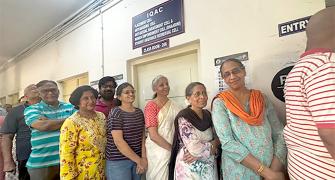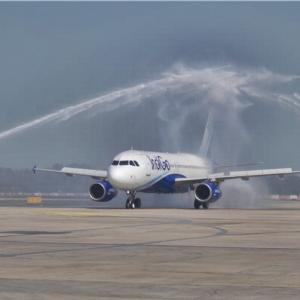Domestic jet fuel prices are up 7%, but are still 14% lower on a y-o-y basis. While lower fuel prices have brought respite to airlines, their non-fuel costs are rising because of rupee depreciation

Domestic airlines’ profits will come under pressure due to rising crude oil price and a weak rupee.
Brent crude oil price has gained 36 per cent since the beginning of the year and touched $48.28 a barrel last Friday. Domestic jet fuel prices are up seven per cent since January, but are still 14 per cent lower on a year-on-year (y-o-y) basis. While lower fuel prices have brought respite to airlines, their non-fuel costs are rising because of rupee depreciation.
The rupee has depreciated five per cent against the dollar on a y-o-y basis and this has impacted the airlines as 30-40 per cent of the expenses are dollar-denominated. These include lease rents, maintenance costs, expatriate staff salaries and interest on foreign borrowings, among others.
IndiGo’s non-fuel cost rose 28 per cent in the fourth quarter of FY16 on a y-o-y basis, while SpiceJet’s non-fuel costs rose 86 per cent largely during the same period owing to a one-off spike in maintenance expense.
A top executive of a private airline said that profits would erode and gains would be wiped out if crude oil slips below $60.
Domestic airlines have benefited from three consecutive quarters of profitability, thanks to lower fuel price. Also, passenger demand has remained robust with 20 per cent growth due to low fares.
Airlines have partially passed on the benefit of lower fuel price to consumers by keeping the fares low. Any hike in fares to offset the increase in costs could impact demand.
According to analysts and executives, the key for carriers is to improve fleet utilisation, raise ancillary revenue and keep non-fuel costs under check.
“The whole idea is to keep non-fuel unit costs low by way of constant monitoring and innovation. Keeping aircraft turnaround time low and enhancing aircraft utilisation per day is critical for spreading the fixed costs over a wider passenger base. The other thing to focus on is ancillary revenues,” said Amber Dubey, partner and head (aerospace and defence) at global consultancy KPMG.
“Growth in India will be now driven by additional capacity and low fares. Fares appear to have bottomed out and from now, they are expected to rise. The only silver lining is that the crude prices are still forecast to be in ‘manageable’ region over the next two years. Margins will erode to some extent, but airlines will remain in the black,” said aviation consultant Anurag Jain.
Photograph: B Mathur/Reuters










